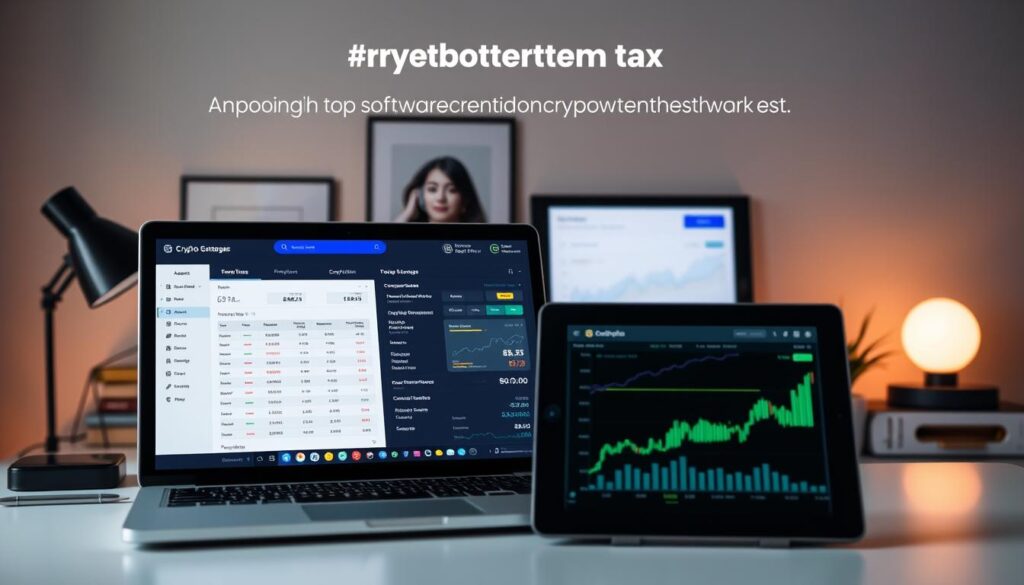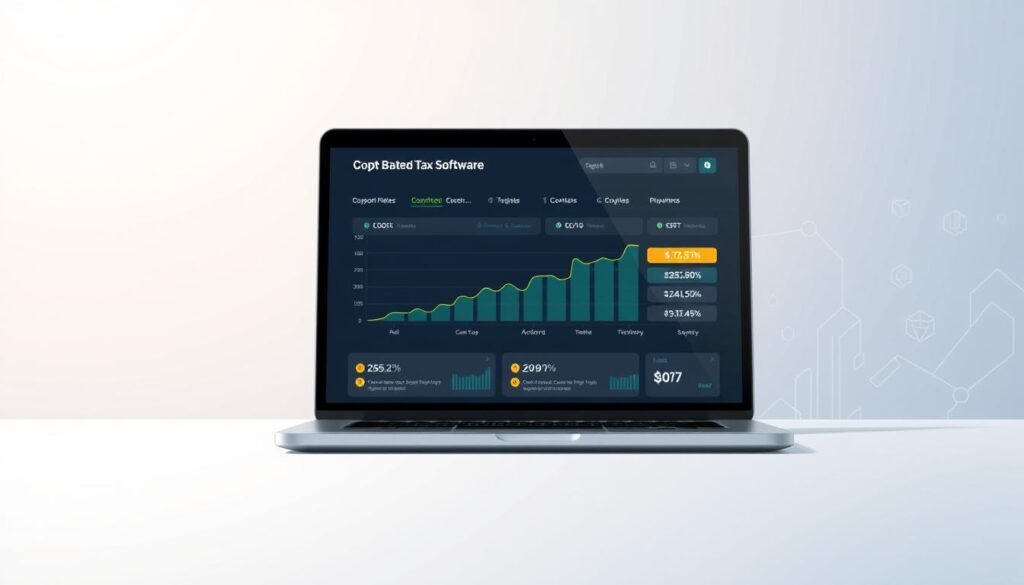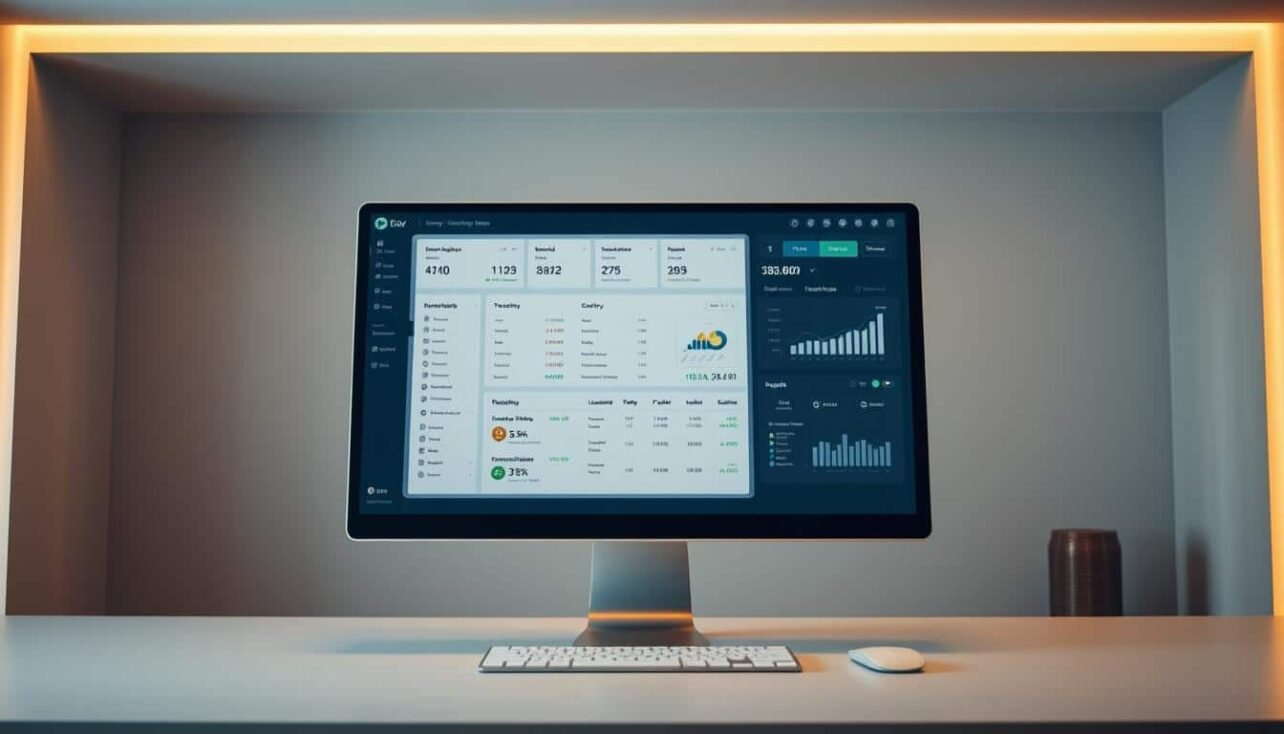Cryptocurrency tax software is now key for dealing with crypto taxes. The IRS is watching digital asset deals more closely. Investors need good software to track trades, figure out gains, and follow reporting rules.
Old ways often miss the details of crypto deals. This can lead to mistakes or lost deductions.
Good crypto tax software makes it easier by getting data from places like Coinbase or Binance. It helps with forms like Form 8949. This guide will show you how to pick, set up, and use these tools right.
You’ll learn about important features, keeping your data safe, and making tax filing easier.
Key Takeaways
- Cryptocurrency tax software automates tracking of trades and calculates capital gains for IRS forms.
- Efficient cryptocurrency tax software reduces human errors in manual reporting.
- IRS regulations require accurate records of crypto transactions for audits.
- This guide covers software selection, setup, and compliance strategies.
- Using specialized tools ensures adherence to evolving tax laws and protects investors from penalties.
Understanding Cryptocurrency Taxation Basics
Cryptocurrency tax software makes following IRS rules easier by focusing on key tax concepts. The IRS sees crypto as property, not money, so you must track every deal. This means each crypto trade or move could lead to tax issues. Using IRS compliant crypto tax software helps report accurately.
How the IRS Views Cryptocurrency
Since 2014, the IRS has treated crypto as property under tax law. This means you must report every crypto deal, from trading to getting paid in crypto. Not reporting these can lead to penalties. Software like cryptocurrency tax software helps by sorting transactions correctly.
Taxable Events in Cryptocurrency
- Selling crypto for fiat currency
- Trading one cryptocurrency for another
- Receiving crypto as payment
- Mining or staking rewards
- Using crypto to purchase goods/services
These events can lead to taxable gains or losses. IRS compliant crypto tax software tracks these, calculates costs, and prepares Form 8949 reports.
Capital Gains vs. Ordinary Income
Short-term gains (held <1 year) are taxed like regular income. Long-term gains (held ≥1 year) get lower capital gains rates. Mining or staking is usually seen as regular income. Cryptocurrency tax software helps sort these, reducing mistakes.
Why Manual Crypto Tax Calculations Fall Short
Trying to manage cryptocurrency taxes by hand is a mess. It’s like trying to track thousands of trades across many places. Mistakes in how much you paid for something or missing important tax events are common. Without efficient cryptocurrency tax software, you might pay too little or too much in taxes. This could get you in trouble with the IRS.
- Tracking chaos: Dealing with CSV files from Binance, Coinbase, and other places makes records hard to keep straight.
- Mathematical complexity: Rules like FIFO/LIFO and fork events need exact math, which people often get wrong.
- Data gaps: Not having price data from old exchanges makes it hard to figure out fair market value.
Reliable crypto tax software makes tracking transactions easy, follows IRS rules, and keeps up with new laws. Doing it by hand leaves no clear record of your taxes. Software can create reports for Form 8949. The IRS wants everything to be right, even for small transactions. Using the right tools can help you avoid fines and stay on the right side of crypto tax rules.
What is Cryptocurrency Tax Software?
Cryptocurrency tax software helps crypto investors with their taxes. It tracks transactions, calculates gains and losses, and fills out IRS forms. It also handles complex situations like forks and DeFi activities.
Core Functions and Features
- Aggregates trades from exchanges and wallets into one dashboard
- Automates cost basis calculations using FIFO, LIFO, or specific ID methods
- Generates Form 8949 and Schedule D drafts
- Identifies tax-loss harvesting opportunities
How It Differs from Traditional Tax Software
Traditional tax software doesn’t handle crypto well. It’s good for stocks or real estate but not for blockchain. Advanced crypto tax software has special features like:
- Blockchain transaction verification
- API connections to 500+ exchanges
- IRS Form 1040 integration
The Technology Behind Automatic Calculations
Advanced crypto tax software uses smart algorithms. It checks millions of transactions every day.
It connects to exchanges like Coinbase and Binance for up-to-date info. AI tools, like those on AI-driven platforms, suggest the best tax strategies. These tools cut down on errors and keep up with changing rules.
Top Benefits of Using Specialized Crypto Tax Solutions
Efficient cryptocurrency tax software changes how we handle crypto taxes. It beats manual methods in many ways. For traders with lots of transactions, it saves a lot of time.
Imagine saving 15+ hours a year by letting software track thousands of transactions fast. This is true for miners, DeFi users, and NFT buyers too.
Time-Saving Automation
Reliable crypto tax software imports data from exchanges like Coinbase or Binance automatically. It uses algorithms to sort trades, forks, and airdrops into taxable events. This makes reporting for Form 8949 and Schedule D much faster.
For active traders, it can cut preparation time by up to 70%.
Error Reduction and Accuracy
Manual errors increase with complex scenarios like hard forks or yield farming. Efficient cryptocurrency tax software follows IRS guidelines automatically. It ensures accurate cost basis calculations.
For example, it handles coin swaps or staking rewards correctly. This avoids overpayment or underreporting that could lead to audits.
Audit Trail Protection
Reliable crypto tax software creates detailed records for audits. It gives users organized ledgers of every transaction. These records show the date, value, and tax implications of each transaction.
This documentation proves compliance with IRS rules on capital gains and reporting thresholds. It also has features like transaction tagging and rule updates for ongoing accuracy as rules change.
Comparing the Best Crypto Tax Software Options
Choosing the right crypto tax software is key. Look for features that fit your needs. Prices and functions vary among the top options. Let’s look at what matters most.
First, check if the software integrates with your exchanges. CoinTracking works with over 500 exchanges. Koinly connects to Coinbase and Binance. CryptoTaxCalculator has advanced scanning for decentralized deals.
- Pricing: Compare free options (like CoinTracking’s $0 tier for under 500 transactions) to premium plans for more users.
- Interface: Koinly is great for beginners. CoinTracking has tools for complex portfolios.
- Support: Look for 24/7 chat support, like cryptoTaxCalculator’s, for quick help.
- Unique Features: Some software offers tax-loss harvesting or auto-generating IRS forms.
Big investors need platforms that handle lots of transactions. Small traders might like free trials. Make sure the software keeps up with tax rule changes. Compare these to find the best software for your needs.
Essential Features to Look for in Cryptocurrency Tax Software
When picking crypto tax software, focus on key features for compliance and accuracy. The best crypto tax software offers automation and customization. It should make complex tasks easy without losing precision. 
Exchange Integration Capabilities
Good software connects smoothly with exchanges and wallets. Top choices like Koinly and CoinTracking work with more than 50 platforms, including Coinbase and Binance. They also support hardware wallets. Look for:
- Support for major exchanges and hardware wallets
- API reliability for automatic data updates
- CSV import for historical records
Transaction Categorization
Sorting transactions automatically is key. The best software categorizes trades, mining rewards, and staking income. It has:
- AI-driven categorization of over 100+ transaction types
- Manual override tools for disputed entries
- Visual dashboards for easy navigation
Tax-Loss Harvesting Tools
Tools for saving taxes are important. Advanced software like ZenLedger finds loss opportunities and suggests selling strategies. It has:
- Automated loss harvesting analysis
- Customizable tax scenario modeling
- Historical performance tracking
Report Generation
IRS-ready reports are essential. User-friendly software creates pre-filled IRS forms 8949 and Schedule D. It offers:
- Automated audit-ready reports
- Custom report templates
- Year-round tax planning dashboards
Step-by-Step Setup Guide for First-Time Users
Setting up user-friendly crypto tax software makes sure you report accurately without feeling overwhelmed. Start by picking a platform like TurboTax’s crypto tools or similar services for IRS compliance. Here’s how to get started:
- Create an Account: Pick a provider with a free trial or a subscription that fits your portfolio size. Log in and choose your tax year (e.g., 2023) during setup.
- Configure Preferences: Set your accounting methods like FIFO or HIFO under “Settings.” Most cryptocurrency tax software starts with FIFO but lets you change it for more advanced users.
- Link Accounts: Connect your crypto exchanges (like Coinbase) via API or import CSV files. Make sure to include all wallets (hardware, custodial) for complete transaction tracking.
- Security Setup: Turn on two-factor authentication and keep API keys in secure vaults. Check the IRS property guidelines to categorize your holdings right.
After setting up, check if your data is correct. If you find errors, use the transaction categorization guide for fixes. Most platforms show red for easy fixes.
Don’t forget to save your work often. Modern user-friendly crypto tax software auto-saves, but it’s good to double-check your export options for a backup. Next, you’ll learn how to import your transaction data.
Importing Transaction Data from Exchanges and Wallets
Getting your crypto transaction data right is key for your reliable crypto tax software to work well. You can connect via API or upload CSV files from places like Coinbase or Binance. Each way has its own speed and security trade-offs.
API Connections vs. CSV Imports
API links link your exchange to tax software live. This cuts down on manual work and errors for efficient cryptocurrency tax software users. CSV files need you to download and upload spreadsheets. They’re slower but work if API access is blocked. Always check the exchange’s documentation for the right format.
Troubleshooting Common Import Issues
- Duplicate entries: Check transaction IDs and use software filters to remove duplicates.
- Timestamp mismatches: Adjust your tax tool’s time zone settings to match the IRS.
- Incomplete imports: Try restarting the import or break up big CSV files into smaller ones.
Handling Missing Transaction Data
If you’re missing data, reach out to exchanges or use wallet logs to fill in the gaps. Keep screenshots of transaction pages for audit proof. Good reliable crypto tax software has tools to spot missing data and guess at the missing values.
Advanced Tax Strategies Using Crypto Software Tools
Advanced cryptocurrency tax software helps plan taxes all year. It does more than just calculate taxes. It lets users optimize gains and cut down on taxes by checking transactions live. It also checks if actions are legal, thanks to IRS compliant crypto tax software.

- Transaction Timing Optimization: Adjust trade dates to align with tax bracket thresholds or life events using the software’s timeline analysis.
- Specific Identification Method: Select which coins to sell to lock in losses or gains, a strategy only possible with detailed tracking in advanced tools.
- DeFi and Staking Compliance: Track rewards and fees from DeFi platforms automatically, ensuring accurate reporting to avoid IRS penalties.
- Year-Round Tax-Loss Harvesting: Set up alerts in the software to trigger loss harvesting opportunities as prices drop, reducing taxable income without manual tracking.
Before making trades, the software lets users try out different scenarios. For example, it shows how selling a certain token batch affects taxes. This helps pick the best legal and financial choice. It also reminds users about important reporting, like for like-kind exchanges.
These tools make complex strategies easy for everyone, not just experts. They use automation and live data for detailed plans while staying within IRS rules. The right software turns tax planning into a continuous, proactive effort to protect wealth and follow the law.
Ensuring IRS Compliance with Reliable Crypto Tax Software
Using IRS compliant crypto tax software is key to meeting tax reporting needs. These tools make complex tasks easier and cut down on mistakes. They help simplify compliance with important filings and changing rules.
Form 8949 and Schedule D Preparation
Good crypto tax software sorts out transactions for Form 8949. It classifies gains as short-term or long-term. Then, it feeds this info into Schedule D, following IRS rules closely. It also has features for making batch edits to fix any errors before filing.
FBAR Requirements for Crypto
- Crypto in foreign exchanges or wallets may need to be reported on FBAR if it’s over $10,000.
- Software keeps track of your crypto across different places, alerting you when you’re close to the reporting limit.
- Tools like crypto tax platforms also watch for foreign exchange activity to help you avoid missing anything.
Staying Updated with Changing Regulations
IRS rules change fast. Reliable crypto tax software keeps up with these changes. It updates its algorithms to match new rules. Subscriptions often include alerts for policy updates and help with audits. It also keeps historical data for audits that cover more than one year.
Choosing software that focuses on compliance helps avoid penalties. It automates forms and updates in real-time. This makes following the rules easier, even when laws change.
Security Considerations When Choosing Crypto Tax Solutions
Choosing secure crypto tax software is key to protecting your financial data. Good crypto tax software focuses on encryption, secure APIs, and user authentication. Here’s how to check if a provider is right for you:
- Encryption: Make sure it uses AES-256 encryption for data at rest and in transit.
- API Access: Only allow read-only permissions—never let tax tools trade for you.
- Two-Factor Authentication (2FA): It must be mandatory for getting into your account.
- Third-Party Audits: Look for providers with annual security audits from certified firms.
Good crypto tax software also has clear privacy policies. Check how long they keep your data and if third parties see it. Stay away from platforms with security issues or unclear data-sharing practices. Following laws like GDPR or IRS guidelines shows they’re responsible.
Secure crypto tax software keeps your data safe by limiting API access and encrypting transactions. Always check their privacy policy to make sure they don’t sell your data. Choose tools that are easy to use but still keep your info safe. This way, you can trust your crypto tax software to protect your financial privacy.
Cost-Benefit Analysis: Is Premium Crypto Tax Software Worth It?
Choosing between free and paid crypto tax tools depends on how active you are in crypto and the size of your portfolio. Premium software, like the best crypto tax software, has features that make it worth the cost for many. Let’s look at the pros and cons.

Free vs. Paid Options
- Free options usually limit transactions to 500/month and don’t support multiple exchanges.
- Premium plans start at $30/month. They offer unlimited data import and advanced audit tools.
ROI for Different Investor Types
Day traders save 20+ hours a year by using top rated crypto tax software instead of filing manually. For example, CoinTracking’s tax-loss harvesting tool saved one user $4,200 in 2023. This was by optimizing capital gains.
Passive investors save $150–$300 in CPA fees by using self-service reporting.
Tax Professional Collaboration Features
- Software like best crypto tax software offer CPA portals for real-time data sharing.
- Automated IRS form generation reduces revisions by 30%, saving time.
Figure out your break-even point: multiply yearly software costs by 3. If you save more in taxes than this, the paid plan is worth it. High-volume traders and big investors usually get their money back in 12 months just by avoiding errors.
Simplifying Your Crypto Tax Future: Best Practices Beyond Software
Managing crypto taxes is more than just using secure crypto tax software. Keeping detailed records of all transactions is key. This includes staking or decentralized swaps throughout the year.
It’s also important to keep personal and business crypto wallets separate. This makes tax filing easier. Always check the tax impact of trades before making them to avoid surprises.
Keep up with IRS updates and work with tax advisors who know crypto. Make sure to back up all transaction records both digitally and physically. This protects against data loss.
Using cryptocurrency tax software tools like automatic tracking and audit-ready reports is helpful. This combination of technology and discipline makes tax seasons easier. It also prepares you for changes in the crypto world.
FAQ
What is cryptocurrency tax software?
Cryptocurrency tax software helps users track their crypto transactions. It calculates taxes and prepares reports for the IRS. This makes managing crypto taxes easier and more accurate.
Why do I need specialized software for crypto taxes?
Specialized software tackles crypto tax challenges like tracking transactions across wallets. It also calculates cost basis for trades and categorizes transactions correctly. This software is IRS-compliant and reduces errors.
How does cryptocurrency tax software ensure IRS compliance?
Reliable crypto tax software generates IRS forms like Form 8949 and Schedule D. It ensures transactions are correctly reported. It also keeps up with tax law changes to help users stay compliant.
Can I use cryptocurrency tax software for multiple exchanges?
Yes, many crypto tax software options support multiple exchanges. They let you import data from various platforms. This is great for investors using different exchanges.
What features should I look for when selecting crypto tax software?
Look for exchange integration, transaction categorization, and tax-loss harvesting tools. Also, consider report generation, user-friendly interfaces, and customer support. These features enhance the software’s usefulness.
Is there a difference between free and paid cryptocurrency tax software?
Yes, free options are good for casual investors but have limitations. Paid software offers more features, better support, and can save more on taxes. It’s worth the investment for serious investors.
How secure is cryptocurrency tax software?
Security is key in crypto tax software. Look for strong encryption, secure API practices, and two-factor authentication. Also, check their privacy policies to understand how they handle your data.
How can I import my transaction data into crypto tax software?
You can import data through API connections or CSV file uploads. API connections sync data in real-time, while CSV imports are simpler. Always follow the software’s guidelines for a smooth import.


No comments yet